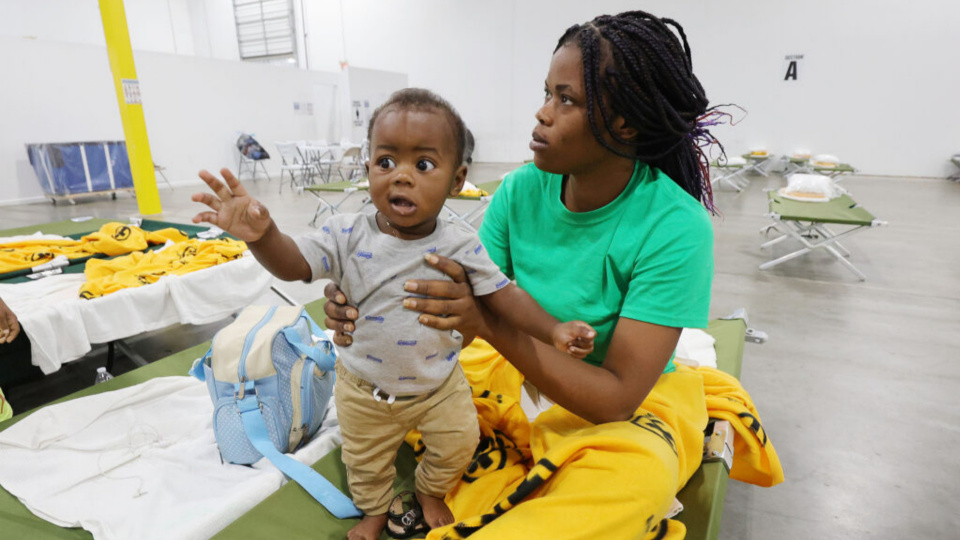
Refugees
Refugee Jouseline Melayer, from Chili, holds her baby, Jayden, at the Family Transfer Center in Houston on Monday, June 7, 2021. The Center provides a temporary respite for families who have been cleared at the United States border and need short-term shelter and food. The center is the result of a collaboration between The Church of Jesus Christ of Latter-day Saints and other partners. Photo by Jeffrey D. Allred, courtesy of Church News.Copyright 2021 by Deseret News Publishing Company.This story appears here courtesy of TheChurchNews.com. It is not for use by other media.
By Sydney Walker, Church News
At least 82.4 million people worldwide were forcibly displaced at the end of 2020 as a result of persecution, conflict or violence, according to the UN Refugee Agency. Nearly 26.4 million of them are refugees, around half of whom are under the age of 18.
World Refugee Day — which falls annually on June 20 — is designated by the United Nations to honor refugees around the globe and celebrate their courage and strength.
The Church of Jesus Christ of Latter-day Saints has been actively engaged for many years in relief efforts for refugees through its humanitarian arm, Latter-day Saint Charities. Since 1991, Latter-day Saint Charities has partnered with the United Nations High Commissioner for Refugees to bring relief and comfort to refugees — both in emergency settings and in resettlement countries.
In 2020, Latter-day Saint Charities efforted 294 refugee response projects in 50 countries and territories, according to its annual report.
Earlier this month, the Church and multiple partners officially opened a new Family Transfer Center in Houston, Texas, to provide humanitarian aid to migrants seeking asylum in the United States.
Latter-day Saint Charities announced in June a $5 million donation to refugees resettling in the United States. The financial gift will be divided among nine refugee resettlement agencies which partner with many charitable organizations. Latter-day Saint Charities is also partnering with several organizations to relieve suffering in Sudan.
Sister Sharon Eubank, first counselor in the Relief Society general presidency and president of Latter-day Saint Charities, has said that refugees and immigrants need three things to make them feel welcome in a community: “They need a friend, they need meaningful work, and they need to be able to practice their peaceful faith.”
Addressing the Royal Institute of International Affairs in London, England, on July 2, 2018, Elder Jeffrey R. Holland, of the Quorum of the Twelve Apostles, called on non-governmental organizations, governments and faith groups to refocus their efforts in responding to the personal and family crises suffered by refugees and internally displaced people.
In October 2015 a letter from the First Presidency encouraged all members to provide assistance to refugees in all parts of the world. Six months later, the First Presidency invited Latter-day Saint women of all ages to assist refugees in their own communities as part of the “I Was a Stranger” effort.
Speaking of this effort during the April 2016 general conference, Sister Linda K. Burton, who was then serving as Relief Society general president, asked sisters worldwide to “prayerfully determine what you can do — according to your own time and circumstance — to serve the refugees living in your neighborhoods and communities.”
Below are some of many Church News articles reflecting Latter-day Saint Charities’ efforts to help refugees worldwide:
- More than 1 million Venezuelan refugees have fled to Colombia. Here’s how Latter-day Saints are helping many of them
- ‘Maybe We Can Help’: A Look into Latter-day Saint Charities’ efforts to ease the pain of refugees in Rome
- Sarah Jane Weaver: Why reaching out locally, as well as globally, matters
- How an Iraqi village exemplified brotherly love
- Viewpoint: Help the refugees among us
- Beirut branch members pack food boxes to help Syrian refugees
- Latter-day Saint Charities partners to help women in Iraq
Want to help refugees but don’t know how? Here are 40 things you can do in your community.
Copyright 2021 Deseret News Publishing Company


